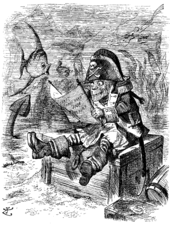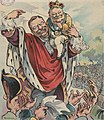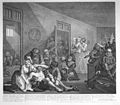Portal:Cartoon
The Cartoon Portal

A cartoon is a type of visual art that is typically drawn, frequently animated, in an unrealistic or semi-realistic style. The specific meaning has evolved, but the modern usage usually refers to either: an image or series of images intended for satire, caricature, or humor; or a motion picture that relies on a sequence of illustrations for its animation. Someone who creates cartoons in the first sense is called a cartoonist, and in the second sense they are usually called an animator.
The concept originated in the Middle Ages, and first described a preparatory drawing for a piece of art, such as a painting, fresco, tapestry, or stained glass window. In the 19th century, beginning in Punch magazine in 1843, cartoon came to refer – ironically at first – to humorous artworks in magazines and newspapers. Then it also was used for political cartoons and comic strips. When the medium developed, in the early 20th century, it began to refer to animated films that resembled print cartoons. (Full article...)

In print media, a cartoon is a drawing or series of drawings, usually humorous in intent. This usage dates from

Selected article -
Eagle was a seminal British children's comic, first published in April 1950. It was founded by Marcus Morris, an Anglican vicar, who felt that the church was not communicating its message effectively. Simultaneously disillusioned with contemporary children's literature, he and artist Frank Hampson created a dummy comic based on Christian values. Morris hawked the idea to several publishers, with little success, until Hulton Press decided to take it on. Following a huge publicity campaign, the first issue sold about 900,000 copies. Featured in colour on the front cover was the comic's most recognisable story, Dan Dare, Pilot of the Future (pictured). Other popular stories included Riders of the Range and P.C. 49. Eagle also contained news and sport sections, and educational cutaway diagrams of sophisticated machinery. Amidst a takeover of the comic's publisher and a series of acrimonious disputes, Morris left in 1959; Hampson followed shortly thereafter. Although Eagle continued in various forms, a perceived lowering of editorial standards preceded plummeting sales, and it was eventually subsumed by its rival, Lion, in 1969. A relaunched Eagle ran for over 500 issues between 1982 and 1994.
Selected character -
Bart Simpson is a fictional main character in the animated television series The Simpsons and part of the eponymous family. He is voiced by actress Nancy Cartwright and first appeared on television in The Tracey Ullman Show short "Good Night" on April 19, 1987. Bart was created and designed by cartoonist Matt Groening while he was waiting in the lobby of James L. Brooks' office. While the rest of the characters were named after Groening's family members, Bart's name was an anagram of the word brat. After appearing on The Tracey Ullman Show for three years, the Simpson family received their own series on Fox, which debuted December 17, 1989. He has appeared in other media relating to The Simpsons; including video games, The Simpsons Movie, The Simpsons Ride, commercials, and comic books; and inspired an entire line of merchandise. Hallmarks of the character include his chalkboard gags in the opening sequence; his prank calls to Moe the bartender; and his catchphrases "Eat my shorts", "¡Ay, caramba!", and "Don't have a cow, man!" Nancy Cartwright has won several awards for voicing Bart, including a Primetime Emmy Award in 1992 and an Annie Award in 1995. In 2000, Bart, along with the rest of his family, was awarded a star on the Hollywood Walk of Fame.
Did you know... -
- ...that 1999's Scooby-Doo! Mystery of the Fun Park Phantom was the first commercial Scooby-Doo computer game for the Windows platform?
- ...that Czechoslovak communist censors banned publishing of the comic album Muriel a andělé?
- ...that Morning Funnies was a fruit-flavored breakfast cereal featuring comic strip characters including Dennis the Menace, Hägar the Horrible, and Funky Winkerbean on the box?
- ...that the two-inch-tall people of The Teenie Weenies were a Chicago Tribune comic strip written by William Donahey for over 50 years?
Selected list -
There have been 131 episodes of Ed, Edd n Eddy, an animated comedy television series created by Danny Antonucci and produced by Canada-based a.k.a. Cartoon. The series debuted on Cartoon Network in the United States on January 4, 1999, and ended on November 8, 2009, with the premiere of the series finale film Ed, Edd n Eddy's Big Picture Show. The series was originally planned to air for four seasons; however, Cartoon Network ordered two additional seasons and three holiday-themed specials as a result of its popularity. Reruns continue to air on Cartoon Network, including airing as part of the revived block Cartoon Planet. The series revolves around three adolescent boys collectively known as "the Eds", who live in a suburban cul-de-sac. Unofficially led by Eddy, the Eds constantly try to scam the fellow cul-de-sac children in order to purchase jawbreakers. The Eds' plans usually fail and leave them in various predicaments. The award-winning series garnered generally positive reviews, and remains the longest running original Cartoon Network series and Canadian-made animated series to date.
General images -
Selected biography -
William Hanna (1910–2001) was an American animator, director, producer, and cartoonist, whose movie and television cartoon characters entertained millions worldwide for much of the twentieth century. Hanna joined the Harman and Ising animation studio in 1930 and steadily gained skill and prominence while working on cartoons such as Captain and the Kids. In 1937, while working at Metro-Goldwyn-Mayer (MGM), Hanna met Joseph Barbera. The two men began a collaboration that was at first best known for producing Tom and Jerry and live action films. In 1957, they co-founded Hanna-Barbera, which became the most successful television animation studio in the business, producing programs such as The Flintstones, The Huckleberry Hound Show, The Jetsons, Scooby-Doo, The Smurfs, and Yogi Bear. In 1967, Hanna-Barbera was sold to Taft Broadcasting for $12 million, but Hanna and Barbera remained heads of the company until 1991. At that time the studio was sold to Turner Broadcasting System, which in turn was merged with Time Warner, owners of Warner Bros., in 1996; Hanna and Barbera stayed on as advisors. Hanna and Barbera won seven Academy Awards and eight Emmy Awards. Their cartoons have become cultural icons, and Hanna-Barbera's shows have a global audience of over 300 million people.
Subcategories
WikiProjects
- Main projects
- Arts • Animation • Comics • Entertainment • Visual arts
- Related Projects
- Anime and manga • Biography • Film • Fictional characters • Media franchises • Music • Television • Video games
Selected quote -
Topics
- Comic book
- Comic strip
- Digital comics
- Graphic novel
- Mobile comic
- Motion comics
- Trade paperback
- Webcomic
- Animator
- Animation director
- Animation studios
- Animation film festivals
- Feature-length films
- Short films
- Television series
- Computer-animated films
- Stop-motion films
- Traditional animation
- Limited animation
- Rotoscoping
- Stop Motion
- Clay
- Cutout
- Graphic
- Model
- Object
- Pixilation
- Puppetoon
- Computer animation
- Flash animation
- PowerPoint animation
- SVG animation
- Cel-shaded animation
- Crowd simulation
- Morph target animation
- Motion capture
- Non-photorealistic rendering
- Skeletal animation
Things you can do

- Requested articles: Fenwick (comics), Khimaera (comics), Mutant Underground Support Engine, Bruce J. Hawker, Marc Dacier, Hultrasson, Frankenstein Comics, Dave Johnson (comics), Paco Medina, Dappere Dodo, New Adventures of the Space Explorers, Habatales, Musical Box, Foo-Foo (TV series), Bonne nuit les petits, The Adventures of Lariat Sam, More...
- Images and photos needed: Request images that are needed from Wikipedia requested images of comics and animation to included in each articles.
- Stubs: Work on stubs in articles in Comics and Animation stubs.
- Infobox: Add infobox that are needed from Category:Comics articles without infoboxes and Category:Animation articles needing infoboxes in articles.
- Deletion sorting: Please see the collection of discussions on the deletion of articles related to comics and animation - compiled by WikiProject Deletion sorting
Related portals
Associated Wikimedia
The following Wikimedia Foundation sister projects provide more on this subject:
-
Commons
Free media repository -
Wikibooks
Free textbooks and manuals -
Wikidata
Free knowledge base -
Wikinews
Free-content news -
Wikiquote
Collection of quotations -
Wikisource
Free-content library -
Wikiversity
Free learning tools -
Wiktionary
Dictionary and thesaurus









































